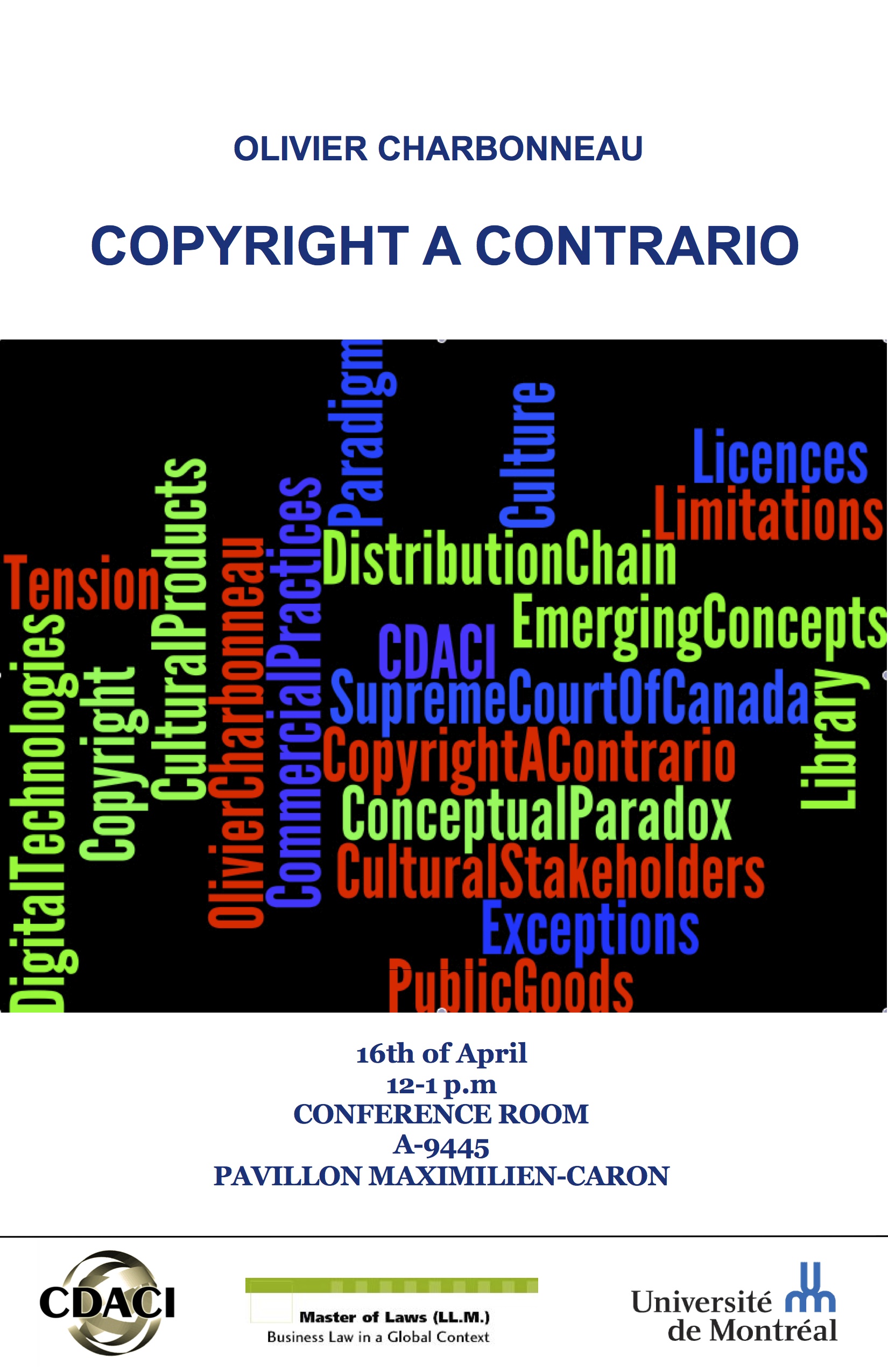Copyright Lectures and conferences
Copyright a contrario – CDACI Lecture series, Université de Montréal
Olivier Charbonneau 2013-04-17
Here is the video of a lecture in English I gave yesterday at Université de Montréal’s Centre du droit des affaires et du commerce International. I also pasted below the abstract and the poster of the event :
[youtube http://www.youtube.com/watch?v=A3GBJPTcf4M&w=640&h=360]

Copyright, caught in a digital maelstrom of perpetual reform and shifting commercial practices, exacerbates tensions between cultural stakeholders. On the one hand, copyright seems to be drowned in Canada and the USA by the role reserved to exceptions by the legislature and the courts granted to certain institutions. On the other, these institutions, such as libraries, are keen to navigate digital environments by allocating their acquisitions budgets to digital works.
Beyond the paradigm shifts brought by digital technologies, one must recognize the conceptual paradox surrounding digital copyrighted works. In economic terms, they behave naturally as public goods, while copyright attempts to restore their rivalrousness and excludability. Within this paradox lies tension, between the aggregate social wealth spread by a work and its commoditized value, between network effects and reserved rights. How can markets emerge if we are not able to resolve this tension?
After discussing some theoretical aspects described above, this paper will attempt to cast new light on user rights (as posited by the Supreme Court of Canada in 2004) and other emerging concepts in copyright. In particular, the making available right will be analysed from the perspective of the library community. The goal is to express how libraries can fit in a distribution chain of cultural products through the two copyright tools at their disposal: licences/limitations and exceptions.
Copyright Universities
A few Fair Use Guides & Statements
Olivier Charbonneau 2012-05-02
Here are a few Fair Use guides setup by institutions. Fair Use is a general exception to copyright applies in the USA – in Canada, we have fair dealings, which applies to private study, research, news reporting, criticism and review.
These guides may be useful in devising our own fair dealings guides.
“Best practices” from the Center for Social Media, includes the following:
– The Code of Best Practices in Fair Use for Academic and Research Libraries from the Association of Research Libraries– Code of Best Practices in Fair Use for OpenCourseWare
– Copyright, Free Speech, and the Public’s Right to Know: How Journalists Think about Fair Use
(Thanks to this post from District Approach, an ALA blog)
For videos:
Fair Use and Video: Community Practices in the Fair Use of Video in Libraries
For music:
– The Music Library Association (USA) has a series of guides delaing with Digital reserves (a type of fair use in libraries, as this one from Indiana University) as well as a general Statement on the Copyright Law and Fair Use in Music.
–
For images:
– Visual Resources Association: Statement on the Fair Use of Images for Teaching, Research, and Study (see this blog post: New College Art Association Standards and Guidelines on the Fair Use of Images posted by Linda Downs)
Academic Integrity Copyright
Academic integrity and Copyright
Olivier Charbonneau 2011-11-01
Here is a talk I missed at the Canadian Library Association’s annual conference and trade show last May (from the program, over 4 MB in PDF) :
B9 – From Plagiarism to Copyright Infringement and Back Again: An Agony in Six Skits
Can I copy this? The question that arises every time someone wants to use information that was created by someone else. Through the use of mini-skits, this session will illustrate the issues that need to be considered when answering this question. It will help participants to distinguish between copyright infringement and plagiarism and suggest ways to make an appropriate decision.
Speakers:
Kathryn Arbuckle, Law Librarian & AUL Information Resources, University of Alberta
Margaret Law, AUL International Relations, University of Alberta
Rare to see copyright and Academic Integrity paired in the same session. I’ve come to wonder about the link between copyright and Academic Integrity, they both include aspects of the other. For example, Copyright, in Canada at least, includes a Moral Right, whereby one must correctly attribute a work to its creator or face sanctions. Academic Integrity, on the other hand, is all about “appropriate” uses of documentation – using, quoting, copying… they seem to intersect, maybe even overlap, but they are also very different.
Copyright is enshrined in law whereas Academic integrity is more akin to a moral code established by local communities (your university, your research group…), vaguely similar to that of other communities but slightly different.
I sometimes think about this during my long train rides to and from work… mostly because I compulsively blog about copyright on my other blog, www.culturelibre.ca (en Francçais).
